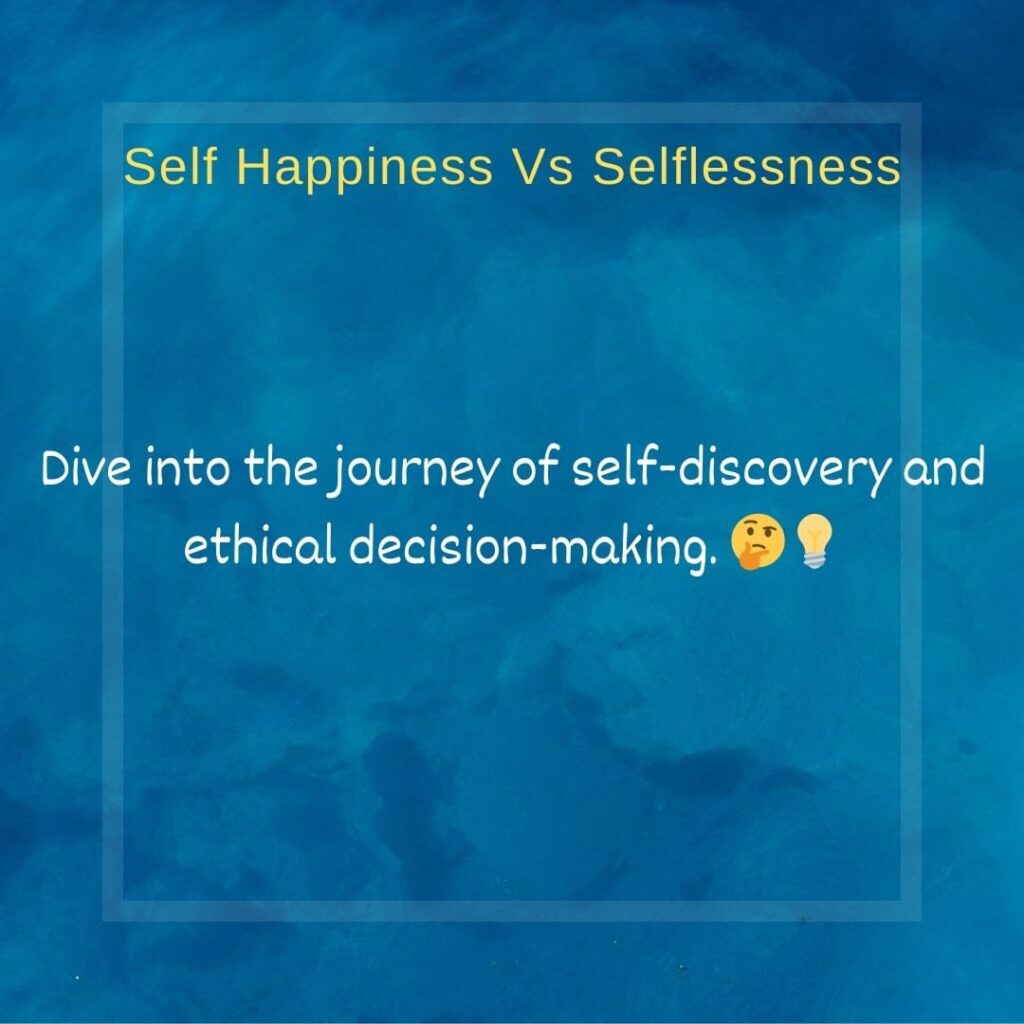In life, decisions often hinge on the delicate balance between personal desires and the potential impact on others. While self-happiness is crucial, it’s equally essential to discern when to prioritize collective well-being. This blog delves into the nuanced interplay of selfishness and self-happiness, exploring scenarios where embracing one’s desires aligns with individual growth and instances where selflessness becomes a moral imperative.
Navigating the Balance: Selfishness and Self-Happiness
Finding harmony between personal contentment and consideration for others is an ongoing journey. Acknowledging the dynamic nature of this balance is the first step towards making informed decisions that contribute positively to both personal and collective happiness.
The Selfish Pursuit of Happiness:
There are instances when prioritizing self-happiness is not only acceptable but necessary. When individual aspirations do not infringe on the rights or well-being of others, embracing one’s desires becomes a powerful tool for personal growth and fulfillment. This section explores the empowering nature of self-driven choices.
Navigating Shared Spaces:
However, life often presents situations where individual desires intersect with the lives of others. In shared spaces, be it relationships, communities, or workplaces, decisions must be approached with a broader perspective. Delving into real-life examples, this part of the blog discusses the repercussions of unchecked selfishness on relationships and societal harmony.
The Ripple Effect:
Actions, whether driven by personal desires or selflessness, have consequences. Examining the ripple effect of choices on the interconnected web of human relationships emphasizes the need for thoughtful consideration before pursuing personal goals.
Cultivating Empathy:
A key aspect of steering through the complexities of selfishness and self-happiness is the cultivation of empathy. Understanding the perspectives and emotions of those around us enables a more compassionate approach to decision-making.
Striking a Balance:
The blog concludes by advocating for a balanced approach. It encourages readers to discern when to prioritize personal desires for growth and fulfillment and when to step back, considering the greater good. Striking this balance becomes a skill, a dance of self-discovery and communal harmony.For further insights on caring for oneself without forgetting others, check out our article here.
Mindful Navigation: Balancing Selfishness and Self-Happiness:
In the intricate dance between selfishness and self-happiness, the key lies in mindful navigation. By understanding the context, considering the consequences, and cultivating empathy, individuals can make choices that not only contribute to personal well-being but also foster a positive impact on the world around them.
Do Follow for More Tips and Inspiration:
- Instagram: Follow us on Instagram
- Pinterest: Follow our Pinterest profile
FAQs regarding “Selfishness and Self-Happiness”
- How can individuals differentiate between healthy self-happiness and selfishness in decision-making?Healthy self-happiness involves pursuing personal fulfillment and growth while considering the well-being of others, whereas selfishness prioritizes personal desires at the expense of others’ rights or happiness. Understanding the difference lies in examining the impact of decisions on oneself and those around them.
- What are some strategies individuals can use to balance personal desires with consideration for others in decision-making?Strategies for balancing personal desires with consideration for others include practicing empathy, seeking compromise in shared spaces, evaluating the potential consequences of decisions, and prioritizing values such as fairness and respect.
- How does cultivating empathy contribute to making more informed and compassionate decisions?Cultivating empathy enables individuals to understand the perspectives, emotions, and needs of others, which in turn facilitates more compassionate decision-making. By considering the experiences and feelings of others, individuals can make choices that are sensitive to the well-being of all involved.
- What role does self-awareness play in navigating the complexities of selfishness and self-happiness?Self-awareness is crucial in recognizing one’s own desires, motivations, and biases in decision-making. It allows individuals to reflect on how their choices may impact themselves and others, leading to more mindful and intentional decision-making processes.
- How can individuals communicate their personal desires effectively while considering the needs and perspectives of others?Effective communication involves expressing personal desires openly and honestly while actively listening to the concerns and perspectives of others. By engaging in respectful dialogue and seeking mutual understanding, individuals can navigate shared spaces with empathy and collaboration.
- What are some potential consequences of unchecked selfishness on relationships and societal harmony?Unchecked selfishness can strain relationships, erode trust, and contribute to conflicts in personal and professional settings. It may also lead to inequality, resentment, and social disconnection, impacting societal harmony and cohesion.
- How can individuals develop the skill of discernment in knowing when to prioritize personal desires and when to prioritize the greater good?Developing discernment involves reflecting on one’s values, considering the needs and perspectives of others, and evaluating the potential consequences of decisions. It requires a balance of introspection, empathy, and critical thinking to navigate complex moral dilemmas effectively.
